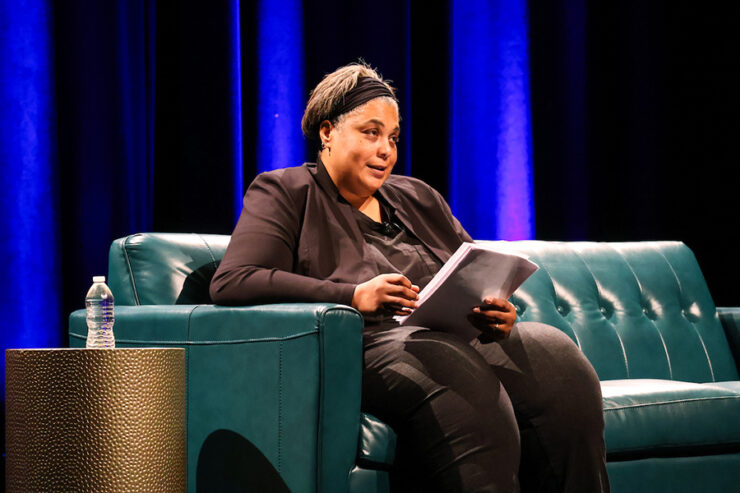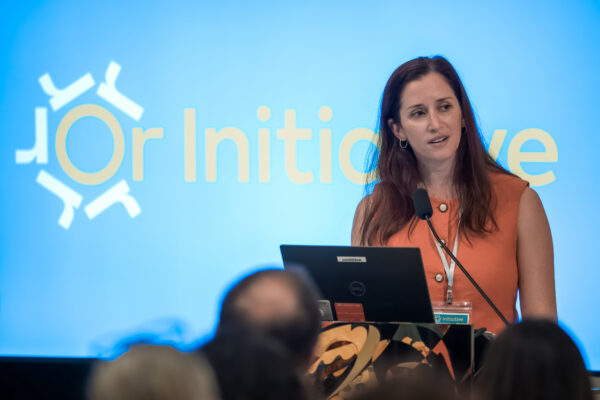Author and cultural critic Roxane Gay addressed an audience of students, faculty and community members at Chapman University on Sept. 25. The event kicked off Engaging the World, the signature lecture series presented by Wilkinson College of Arts, Humanities, and Social Sciences, which this year is addressing the theme of gender and sexuality.
Gay, Ph.D., rose to prominence in 2014 with the publication of her collection of essays, “Bad Feminist,” and her body of work includes novels, short stories, Marvel comics and the memoir “Hunger.” Her most recent publication is “Opinions: A Decade of Arguments, Criticism, and Minding Other People’s Business.” She holds the Gloria Steinem Endowed Chair in Media, Culture and Feminist Studies at Rutgers University.
“I’m a realist who longs for a better world for as many people as possible,” said Gay, seated comfortably on a sofa on the main stage of Musco Center for the Arts. She spoke about her experience as a public figure who is often targeted with hostility by people who dislike her ideas.
“People often ask me about dangerous ideas,” Gay said. “I think they think that believing women are people is a dangerous idea, and I suppose in some ways it is. And when you have dangerous ideas, when you dare to believe in challenging the status quo, people don’t necessarily take well to it.”
Gay described incidents of harassment and threats she has experienced, and how they have affected her life, her work and her family.
“When you’re in the public eye, even to a small extent, you expose yourself to feedback, call and response. This goes with the territory, we’re told, and I accept that, yes, none of us are writing into the void, and that if we’re willing to offer ideas, we must receive them in return. But what I don’t accept is that enduring constant ambient violence is the only way to navigate public discourse,” she said.
“People often call me fearless, but I’m not. I’m afraid, but I write what I want to write anyway. As I get deeper into my career, I should feel less afraid to speak up, but instead, I feel more afraid, and what I’m afraid of is not disagreement or even online trolls. I’m afraid for my life. I’m afraid for the lives of my family,” she said.
“It is a bitter, chalky truth tonight that I don’t know how to reconcile being a writer, a black woman writer, with deeply held opinions. It should not be a dangerous proposition. It shouldn’t be dangerous to be outspoken or provocative or even contrarian. It should not be dangerous to think publicly. And yet, here we are.”
Gay went on to suggest a path toward a more civil exchange of ideas while still embracing the ideal of freedom of speech.
“We are in an age of inelasticity, and the danger of inelasticity is that we are becoming unyielding. If we are not careful, we are all about to break, and the world will break right along with us,” she said.
“The only way we will be able to do this is by becoming less inelastic, more flexible, more interested in listening to the voices of others … We can all stop screaming to ourselves and start talking and listening to each other, giving one another the benefit of the doubt, trying to believe that we can move toward some kind of common good that is one small stand that we can take, and then whatever stand we take next will be that much more effective.”
Following her remarks, Gay was joined on stage by Kelli Fuery, professor of creative and cultural industries at Wilkinson College, who asked several questions, including those submitted by Chapman students. Among her responses were:
On the challenge of making complex ideas accessible in writing, and strategies for engaging readers with difficult ideas:
“I made a commitment to myself early on in my graduate career to not write badly and to make sure that my work was accessible to multiple audiences, not only my peers within academia, but to people in the communities that I’m a part of, the communities where the university was located and where I live.
“And the reality is that people are smart, and you don’t have to dumb ideas down to make them accessible. You have to just write about them in interesting ways and in ways that people can find some point of connection to. So I’m always looking for a point of connection in my work. I’m looking for the things that we tend to have in common, so that I can then talk about the ways in which we are different.”
On modern feminism:
“For many years now, a lot of feminists have believed that what we’re trying to do is reach parity with men…but perhaps we should aim a little higher and not try to replicate the systems that are already existing, because they don’t work. They don’t actually help enough people.
“So perhaps we shouldn’t strive to ‘girl boss’ our way through life. Perhaps there’s a different way, and I do hope that as feminist conversations continue and as feminist work continues forward, that we do find ways of figuring out what are we actually striving for, and why, and how about we not settle for less?
“If we’re going to dream big, if we’re going to have activism that actually creates real change, let’s really create real change. Let’s do some revolutionary kind of stuff, and we’ll see what happens. I think we’re capable of it.”
Advice for her younger self:
“My main advice to my younger self would be, like, ‘Don’t go out with that one guy.’
“Life is short. I would tell my younger self to be more discerning and to tolerate less bulls—.”
The Engaging the World: Gender and Sexuality series will continue throughout 2024, looking at how bodies, lived experiences and subjectivities are shaped by the social constructs of gender and sexuality. See the full schedule of lectures, film screenings and readings.




